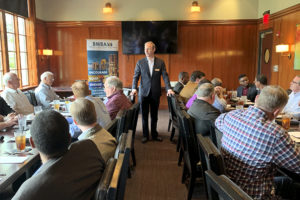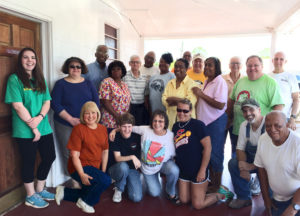 [1]
[1]
Birmingham residents were shattered out of segregated complacency in 1963 by televised images of children as young as eight charged by snarling police dogs and laid flat by a barrage of high-pressure water aimed from fire hoses. They (and the nation) woke to the need for equality, in public buildings at any rate.
Churches were another matter. Until in 1989 John Porter, influential pastor of Sixth Avenue Baptist Church [2], approached Southern Baptists about the possibility of partnering with National (Black) Baptists for the sake of inclusion.
Promoting Inclusion
Birmingham Metro Baptist Association led in that endeavor to “model what it means to have the love of Christ within us,” John King told SBC LIFE. King is church and community relations specialist with the association, on staff since 1988.
“We have to be honest about the issues,” King said. “We have to admit discrimination in any form hurts. We the people of God have to speak up and speak out against injustice anywhere and everywhere.”
For twenty-five years black and white Baptists gathered at an annual human relations conference at Shocco Springs, Alabama, sponsored by the association.
“People came from different churches, different associations, different state conventions,” King recalled. “They would come together and talk openly about race relations and how we might partner and do better together. It was a great time of worship and fellowship.”
Over the last five years that event has transitioned into a more inclusive event that now also involves Hispanic, Korean, and other ethnicities.
“There’s an intentionality to be very culturally inclusive,” King said. “I think the intention was to give recognition to the fact there are more ethnic groups and have more cultural discussions.
“I think there needs to be a continuation and open honest dialogue about race relations between blacks and whites but we also have to acknowledge, admit, and accept there are other groups, other ethnicities, and we need to hear their stories to understand how we need to partner together and be the people God has called us to be,” King continued. “What I think Southern Baptists can be proud of is how the association has reached out cross-culturally to improve race relations for the glory and honor of the Lord.”
At the same time Birmingham Metro Baptist Association has been developing racial inclusion, it’s been expanding the ministries of the 126 churches under its fellowship umbrella. The association exists to serve the churches, Chris Crain told SBC LIFE.
Crain, new this January as the association’s executive director, immediately began meeting with pastors throughout the metro area, leaders both in the association and in churches with the same doctrines.
“I’ve made it a priority to get out and engage with those who want to be a part of us or to be a part of something bigger than themselves,” Crain said. “I have engaged with those who have SBC ties in their leadership and those who share our Baptist beliefs.”
As a result, “We are beginning to onboard more churches—multiethnic and multicultural churches—that will really broaden the spectrum across the association,” Crain continued. “I’m excited about that, about reaching more people across the metro area.”
The Birmingham metro area in north-central Alabama includes an estimated 1.1 million people in seven counties, according to the U.S. Census Bureau’s 2017 projections. Its two principal cities outside Birmingham are Hoover and Talladega, and seven additional cities have populations more than 10,000.
In the last several decades of suburb expansion, several communities have transitioned from one people group to another.
“We’ve had changing communities up and down the valley,” King said. “A great work has taken place. A lot of churches that continue to do the work to advance the Kingdom have facilities that in many instances were deeded to them, either given to them outright or at a very low cost.
“I think what many may not know that they should know is that the lives of people are being transformed by the preaching and teaching of the Gospel [in churches that transitioned to new congregations], and faithful men and women carrying on the work,” the BMBA staff member continued. “We have a new generation, new ideas. The leaders are well-credentialed and have that same spirit of inclusiveness to reach out and partner and to bridge gaps that may exist cross-culturally for the glory of God and the good of all mankind.”

Partnering in Ministries
The Baptist Health System founded in 1922 by the association, grew to include five major hospitals in Birmingham. A joint partnership with Tenet Health Care in 2015 brought in a sixth hospital and—new this summer—a twenty-room hotel on the sixth floor of the Brookwood Baptist Hospital.
“We’re going to use it as a ministry for those who have family or friends in the hospital, and provide opportunities for local churches for hospitality ministry while they’re in town,” Crain said. “Meeting people’s needs is essential to the fabric of who we are. When we are able to extend hands of compassion and care, it helps us advance the ministry of the Gospel.”
Disaster Relief since the late 1990s has been a major component of the association’s ministry, with chain saw, feeding, shower, and mud-out units, and training every couple of months. Greg Moore is the White Cap in charge. A Disaster Relief Center is being designed that will house all the equipment and training needs.
“Another of the things we’re moving toward, resourcing for revitalization and church planting,” Crain said. “We want all our churches to be healthy. We’re doubling down in our efforts in revitalization. That’s something I wanted to see happen and that the search committee wanted to see happen.
“We’re looking at how to access churches in ways that will help them,” the associational missionary continued. “A healthy church is multigenerational, theologically robust, and is connected to missions.”
Other ways Birmingham Metro Baptist Association helps its churches include a ministry center in a former church facility that now serves as an incubator for church planting and other ministries; providing assistance with administration and financial bookkeeping for smaller churches; linking churches of all sizes with First Responders across the metro area for ministry support; assisting churches with a full-time graphic designer to consult with them on their marketing/publicity issues; “and several other things,” Crain said.
“I believe our churches will thrive and join the Holy Spirit in what He is doing when we partner together across racial and ethnic lines,” the associational mission strategist said. “We will join Jesus Christ in His mission as He works through us cross-culturally both here in our metro area and across the globe, and it will certainly mean sacrificing our preferences.
“Sometimes I think we are prone to be attracted to relationships and people who are like us,” Crain continued. “We have to break loose of those bonds that keep us from enriching our lives and ministries. And yet, from my vantage point, it’s very encouraging when I see pastors sharing life-on-life with pastors of different races. A growing reconciliation between blacks and whites is very real, even if the media doesn’t pick up on it.”
